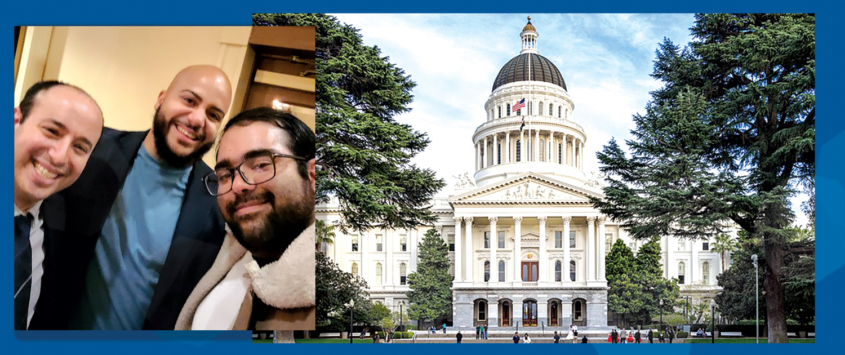
Their Luskin Connection Extends to Sacramento
LUSKIN UP-CLOSE
For three 2018 alumni, a friendship that started at UCLA Luskin has led to legislation under consideration by the California Legislature.
Parshan Khosravi is a policy advocate. Isaac Bryan is an assemblyman. Caleb Rabinowitz is Bryan’s chief of staff. They’ve known each other since the 2016 new student orientation for their public policy master’s cohort at UCLA. Now, they are working to pass Assembly Bill 274 and benefit lower income graduate students.
Because MPP cohorts are relatively small, classmates get to know each other even if they take different paths through graduate school. Bryan has always been politically astute, Khosravi said, and he was already influencing policy change at the local level while at UCLA.
“And then we have somebody like Caleb … who was both a genius and genuinely kind person, one of the most exemplary students in our class,” Khosravi said. “Meanwhile, I would probably say I was one of the worst students,” Khosravi joked.
A self-described student government junkie, Khosravi’s world at the time revolved around the UCLA Graduate Student Association and advancing campus-related issues.
“So, each of us took a different route. One was a scholar who worked on developing policies, one went on to do grassroots and civil rights organizing and ultimately getting elected to office, and one went on to become a lobbyist and education advocate. And it all ended up coming back and working in collaboration,” he said.
A bonding experience, Khosravi said, was the 2016 presidential election. Like most classmates, they opposed Donald Trump, and the election result was a shock.
“We all realized that the expectations we came in with were not going to be our experience,” Khosravi said. Their bond was strengthened by “the collective need to do something about it.”
After graduation, Khosravi stayed in touch as Bryan won a seat in the California Assembly in 2021 with Rabinowitz as his campaign manager and then chief of staff. Meanwhile, Khosravi’s student government experience had led to work that included lobbying in Sacramento. Today, he is California policy director for uAspire, a nonprofit that focuses on removing financial barriers to higher education.
He is often among the first to hear about policy issues in higher education, including a situation involving the eligibility determination for student recipients of two assistance programs — CalFresh, which provides healthy, nutritious food for qualified households, and CalWORKS, which provides cash aid and services for low-income families with a child in the home.
If student recipients get a scholarship, grant or other financial award, it counts as income when determining future eligibility.
“You would think that we shouldn’t tax folks who are low income for going out of their way and getting an award or a scholarship of merit,” Khosravi said.
He knew of an effort in Massachusetts to address this situation, so he raised the issue over coffee with Rabinowitz in Sacramento. Soon, Bryan was sponsoring similar legislation for California.
At press time, AB-274 was still going through the legislative process, but Khosravi said its prospects for passage are strong.
“We expect the bill to be heard in committee soon, and we have a broad coalition of education, welfare and basic needs organizations supporting it. This may be a wonky and technical bill, but its impact will be deeply felt for a lot of grad students who don’t have a big income stream,” Khosravi said. “And we would have never been able to work on this if it wasn’t for Luskin bringing us together.”








Leave a Reply
Want to join the discussion?Feel free to contribute!